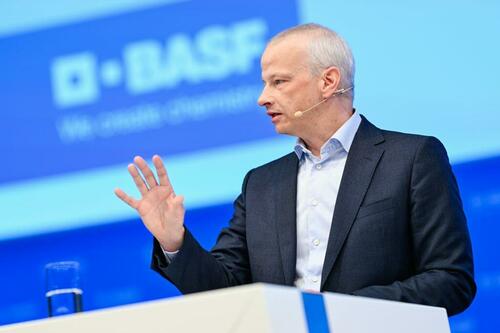Submitted by Thomas Kolbe
The roadmap is already set: in the coming years, the EU and its member states will make both businesses and consumers pay even more for CO₂ emissions. BASF CEO Markus Kamieth warns of the enormous destructive potential of this policy.
Truth comes on pigeon feet – Friedrich Nietzsche already knew that. And apparently, the same applies to European climate policy: slowly, but inevitably, the reality of the true costs of the green transformation and its impact on Germany’s industrial foundation is emerging.
On October 29, BASF’s CEO Markus Kamieth faced the press during the quarterly results presentation. What he announced was another cold shower for anyone still hoping for a new economic miracle.
Weak Results in a Stable Environment
The world’s largest chemical company reported a 3% decline in revenue in Q3 2025 compared to last year, while EBITDA fell by 5%. BASF is under massive pressure and has already cut 1,400 jobs to meet growing cost pressures.
BASF’s numbers have to be seen against the backdrop of a slowly recovering global economic cycle. Especially the U.S. economy, growing nearly 4%, is driving strong demand. Economies in China and India continue to expand dynamically, particularly in sectors critical to the chemical industry.
While the global economy gains momentum, BASF – like much of Germany’s chemical sector and the broader industry – continues to lose ground.

The company’s main site in Ludwigshafen is hit hardest, leaving its 33,000 employees facing an uncertain future.
Criticism of the Climate Course
Kamieth was unexpectedly outspoken during the presentation. In addition to criticizing EU trade policy and rising energy costs in Germany, he struck at a rarely openly discussed wound: the EU’s climate policy.
Kamieth didn’t mince words, calling the European CO₂ emissions trading system (EU ETS 2) what it is: an attack on Europe’s industrial foundation.
For BASF alone, if the current climate course within CO₂ trading remains unchanged, annual additional costs of around €1 billion will arise from 2027 onward, when exemptions are removed – costs borne exclusively by European industry, while the rest of the world simply does not participate.
Kamieth hit a sore spot. EU industry is being financially squeezed by an ideologized CO₂ policy. Deindustrialization is – whether unspoken or suppressed – the result of Brussels’ policies and their national enforcers, whose only response to their self-inflicted disaster is ever-new subsidies.
Rare Criticism
Criticism of this centrally planned climate disaster for industry is rare. All the more remarkable are the unmistakable words of the BASF CEO – just two weeks after the sharp critique from Evonik CEO Christian Kullmann. Both direct their warnings to the same address: European isolationism in climate policy.
Kullmann also called for a comprehensive reform of CO₂ emissions trading – or even the complete abolition of the system. He openly called it “economic madness.”
Both CEOs understand global competition. And they know: nobody will follow the Brussels line.
Climate Club Increasingly Isolated
The global climate club is becoming increasingly isolated. At COP30 in Brazil, the U.S. exit from the Paris Agreement confirmed that even leading industrial nations no longer follow Europe’s push for CO₂ dominance.
This development exposes cracks in the belief in a solely CO₂-driven climate change – a signal European climate policy cannot conceal.
Both COP30 and the increasingly frequent EU climate summits reveal the lengths to which authorities go to prevent these doubts from taking root in public consciousness.
Too much is at stake: the gigantic CO₂ tax machine, which in the coming years is designed to funnel massive funds primarily to Brussels’ central EU apparatus.
Ironclad Media Curtain
The situation is similar to nuclear power. Behind an ironclad media curtain spun by the political-media complex around this energy source, the German public remains unaware that nuclear power is making a global comeback – aiming to nearly double capacity in the next three decades.
The silence in climate policy has been bought at a high price – through the climate redistribution machine, which increasingly restrains large parts of the economy.
The annual volume of CO₂ trading is set to nearly triple to around €100 billion in the coming years, plus CO₂ taxes and other climate levies that also hit consumers.
Consider, for instance, the flight levies that are literally wiping Germany off the map as a location for air travel.
Enormous Economic Losses
The actual capital misallocation forced by climate policy and lawmakers is difficult to quantify. We are dealing with a tangle of taxes, subsidies, fiscal advantages, hidden support, and price guarantees.
Yet, it is realistic to estimate that around 4–5% of GDP is being burned outside market mechanisms.
With the expansion of the trading system and the massive increase in climate subsidies, Germany will lose €150–200 billion in productive capital annually. It is therefore no exaggeration to call Brussels’ climate policy a poverty engine – one that is systematically draining Europe’s industrial base in global competition.
The EU has established a Climate Social Fund (CSF), initially equipped with around €10 billion per year, to support households and small businesses in the so-called green transformation. This shows Brussels is fully aware of the consequences – making this policy ethically all the more reprehensible.
We are witnessing increasing centralization of political power in Brussels – justified by the moral imperative of carbon dioxide – a civilizational bow to the climate cult.
* * *
About the author: Thomas Kolbe, born in 1978 in Neuss/ Germany, is a graduate economist. For over 25 years, he has worked as a journalist and media producer for clients from various industries and business associations. As a publicist, he focuses on economic processes and observes geopolitical events from the perspective of the capital markets. His publications follow a philosophy that focuses on the individual and their right to self-determination.
Loading recommendations...